中考英语综合训练 时态综合讲义
- 格式:doc
- 大小:58.02 KB
- 文档页数:5
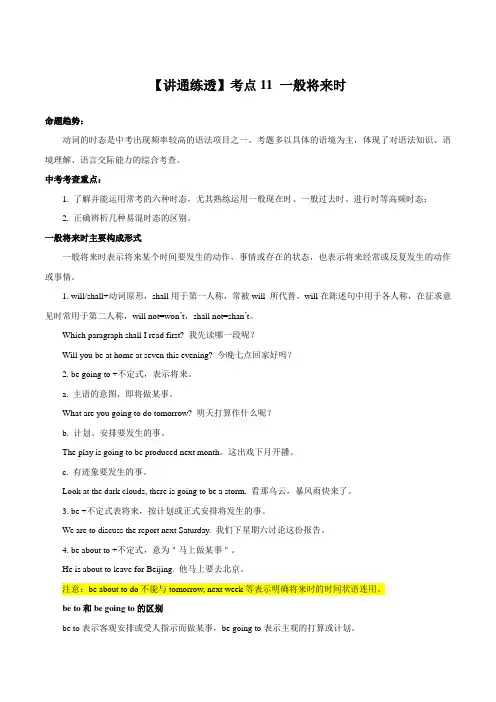
【讲通练透】考点11 一般将来时命题趋势:动词的时态是中考出现频率较高的语法项目之一。
考题多以具体的语境为主,体现了对语法知识、语境理解、语言交际能力的综合考查。
中考考查重点:1. 了解并能运用常考的六种时态,尤其熟练运用一般现在时、一般过去时、进行时等高频时态;2. 正确辨析几种易混时态的区别。
一般将来时主要构成形式一般将来时表示将来某个时间要发生的动作,事情或存在的状态,也表示将来经常或反复发生的动作或事情。
1. will/shall+动词原形,shall用于第一人称,常被will 所代替。
will在陈述句中用于各人称,在征求意见时常用于第二人称,will not=won’t,shall not=shan’t。
Which paragraph shall I read first? 我先读哪一段呢?Will you be at home at seven this evening? 今晚七点回家好吗?2. be going to +不定式,表示将来。
a. 主语的意图,即将做某事。
What are you going to do tomorrow? 明天打算作什么呢?b. 计划、安排要发生的事。
The play is going to be produced next month。
这出戏下月开播。
c. 有迹象要发生的事。
Look at the dark clouds, there is going to be a storm. 看那乌云,暴风雨快来了。
3. be +不定式表将来,按计划或正式安排将发生的事。
We are to discuss the report next Saturday. 我们下星期六讨论这份报告。
4. be about to +不定式,意为"马上做某事"。
He is about to leave for Beijing. 他马上要去北京。
注意:be about to do不能与tomorrow, next week等表示明确将来时的时间状语连用。
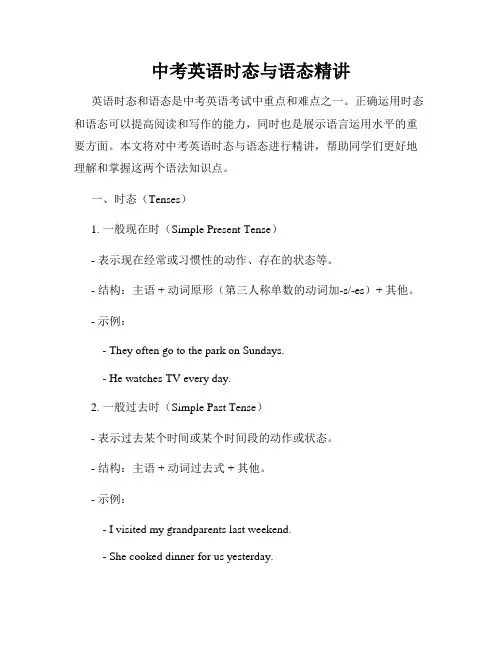
中考英语时态与语态精讲英语时态和语态是中考英语考试中重点和难点之一。
正确运用时态和语态可以提高阅读和写作的能力,同时也是展示语言运用水平的重要方面。
本文将对中考英语时态与语态进行精讲,帮助同学们更好地理解和掌握这两个语法知识点。
一、时态(Tenses)1. 一般现在时(Simple Present Tense)- 表示现在经常或习惯性的动作、存在的状态等。
- 结构:主语 + 动词原形(第三人称单数的动词加-s/-es)+ 其他。
- 示例:- They often go to the park on Sundays.- He watches TV every day.2. 一般过去时(Simple Past Tense)- 表示过去某个时间或某个时间段的动作或状态。
- 结构:主语 + 动词过去式 + 其他。
- 示例:- I visited my grandparents last weekend.- She cooked dinner for us yesterday.3. 一般将来时(Simple Future Tense)- 表示将来某个时间或某个时间段的动作或状态。
- 结构:主语 + will + 动词原形 + 其他。
- 示例:- We will have a party next week.- He will call you later.4. 现在进行时(Present Continuous Tense)- 表示现在正在进行的动作。
- 结构:主语 + am/is/are + 动词-ing + 其他。
- 示例:- They are playing basketball in the park right now. - She is reading a book at the moment.5. 过去进行时(Past Continuous Tense)- 表示过去某个时间或某个时间段正在进行的动作。
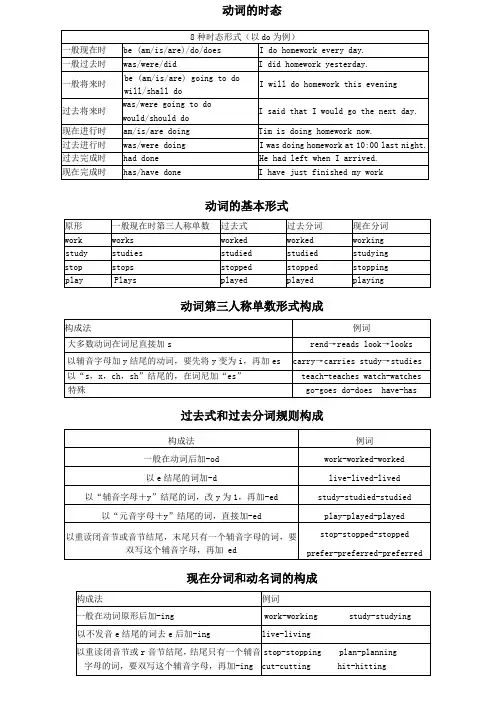
动词的时态动词的基本形式动词第三人称单数形式构成过去式和过去分词规则构成现在分词和动名词的构成1.概念:表示经常或习惯发生的情况;有规律出现的情况:事实真理。
2.时间状语:always,usually,often,sometimes,every week (day,year,month...),once a week(day,year,month...).on Sundays (Mondays...).etc.3.基本结构:主语+be动词/动词原形(如主语为第三人称单数,动词要改为第三人称单数形式)+其他4.否定形式:主语+am/is/are+not+其他主语+don’t/ doesn’t+动词原形+其他。
5.一般疑问句:Am/ls/Are+主语+其他Does/Do+主语+动词原形+其他。
eg:(1)Action speaks louder than words.事实胜于雄辩。
(2) This pub doesn’t provide lunches.这家酒馆不供应午餐。
(3)Is your jacket real leather?你的夹克是真皮的吗?一般过去时1.概念:过去某个时间里发生的动作或状态;过去习惯性、经常性的动作、行为。
2.时间状语:ago,yesterday,the day before yesterday,last week(year, night, month…), in 1989, just now, at the age of 5, one day, long long ago,once upon a time, once, the day before. etc.3.基本结构:主语+动词的过去式或be动词的过去式+其他4.否定形式:主语+was/were+not+其他主语+didn’t+动词原形+其他5.一般疑问句:Was/were+主语+其他Did+主语+动词原形+其他eg:(1)She often came to help us in those days.那些天她经常来帮助我们。
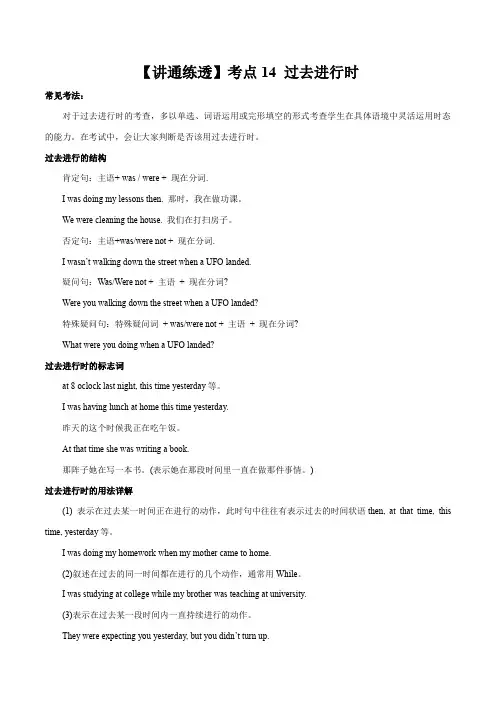
【讲通练透】考点14 过去进行时常见考法:对于过去进行时的考查,多以单选、词语运用或完形填空的形式考查学生在具体语境中灵活运用时态的能力。
在考试中,会让大家判断是否该用过去进行时。
过去进行的结构肯定句:主语+ was / were + 现在分词.I was doing my lessons then. 那时,我在做功课。
We were cleaning the house. 我们在打扫房子。
否定句:主语+was/were not + 现在分词.I wasn’t walking down the street when a UFO landed.疑问句:Was/Were not + 主语+ 现在分词?Were you walking down the street when a UFO landed?特殊疑问句:特殊疑问词+ was/were not + 主语+ 现在分词?What were you doing when a UFO landed?过去进行时的标志词at 8 oclock last night, this time yesterday等。
I was having lunch at home this time yesterday.昨天的这个时候我正在吃午饭。
At that time she was writing a book.那阵子她在写一本书。
(表示她在那段时间里一直在做那件事情。
)过去进行时的用法详解(1) 表示在过去某一时间正在进行的动作,此时句中往往有表示过去的时间状语then, at that time, this time, yesterday等。
I was doing my homework when my mother came to home.(2)叙述在过去的同一时间都在进行的几个动作,通常用While。
I was studying at college while my brother was teaching at university.(3)表示在过去某一段时间内一直持续进行的动作。
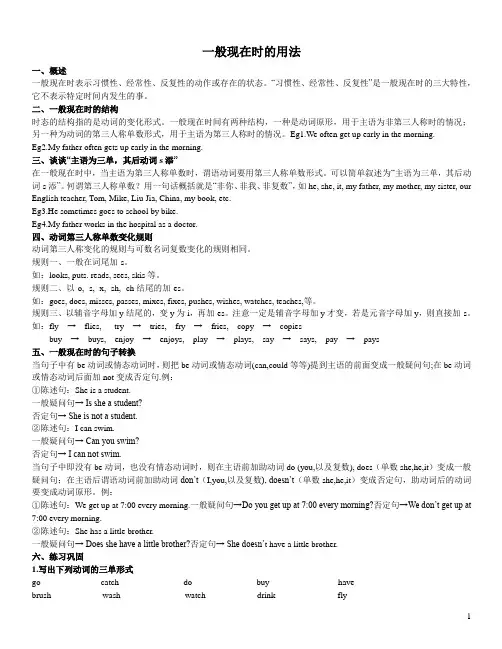
一般现在时的用法一、概述一般现在时表示习惯性、经常性、反复性的动作或存在的状态。
―习惯性、经常性、反复性‖是一般现在时的三大特性,它不表示特定时间内发生的事。
二、一般现在时的结构时态的结构指的是动词的变化形式。
一般现在时间有两种结构,一种是动词原形,用于主语为非第三人称时的情况;另一种为动词的第三人称单数形式,用于主语为第三人称时的情况。
Eg1.We often get up early in the morning.Eg2.My father often gets up early in the morning.三、谈谈“主语为三单,其后动词s添”在一般现在时中,当主语为第三人称单数时,谓语动词要用第三人称单数形式。
可以简单叙述为―主语为三单,其后动词s添‖。
何谓第三人称单数?用一句话概括就是―非你、非我、非复数‖,如he, she, it, my father, my mother, my sister, our English teacher, Tom, Mike, Liu Jia, China, my book, etc.Eg3.He sometimes goes to school by bike.Eg4.My father works in the hospital as a doctor.四、动词第三人称单数变化规则动词第三人称变化的规则与可数名词复数变化的规则相同。
规则一、一般在词尾加-s。
如:looks, puts. reads, sees, skis等。
规则二、以-o, -s, -x, -sh, -ch结尾的加-es。
如:goes, does, misses, passes, mixes, fixes, pushes, wishes, watches, teaches,等。
规则三、以辅音字母加y结尾的,变y为i,再加-es。
注意一定是辅音字母加y才变,若是元音字母加y,则直接加-s。
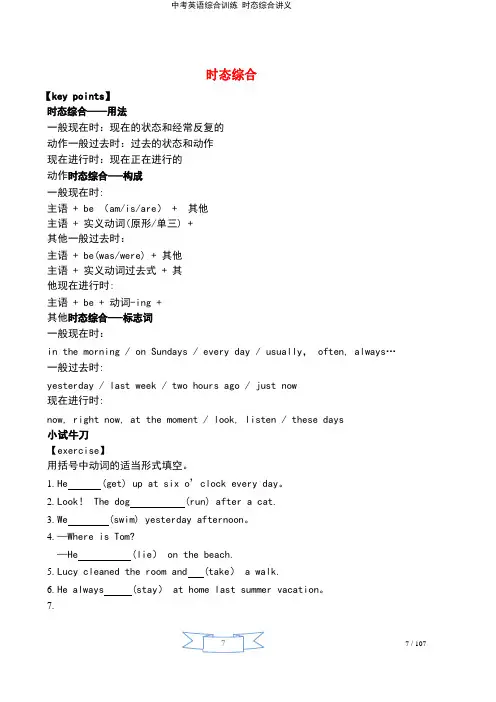
时态综合【key points】时态综合——用法一般现在时:现在的状态和经常反复的动作一般过去时:过去的状态和动作现在进行时:现在正在进行的动作时态综合-—构成一般现在时:主语 + be (am/is/are) + 其他主语 + 实义动词(原形/单三) +其他一般过去时:主语 + be(was/were) + 其他主语 + 实义动词过去式 + 其他现在进行时:主语 + be + 动词-ing +其他时态综合—-标志词一般现在时:in the morning / on Sundays / every day / usually,often, always…一般过去时:yesterday / last week / two hours ago / just now现在进行时:now, right now, at the moment / look, listen / these days小试牛刀【exercise】用括号中动词的适当形式填空。
1.He (get) up at six o’clock every day。
2.Look! The dog (run) after a cat.3.We (swim) yesterday afternoon。
4.—Where is Tom?—He (lie) on the beach.5.Lucy cleaned the room and (take) a walk.6.He always (stay) at home last summer vacation。
7.时态综合——句式变换一般现在时:①I am in Zhengzhou。
否定 I’m not in Zhengzhou。
一般疑问 Are you in Zhengzhou?特殊疑问 Where are you?②Tom loves cats.否定 Tom doesn’t love cats。
一般疑问 Does Tom lovecats?特殊疑问 What doesTom love? 一般过去时:① I was in Zhengzhou.否定 I wasn’t in Zhengzhou.一般疑问 Were you in Zhengzhou?特殊疑问 Where were you?② Tom loved cats.否定 Tom didn’t love cats.一般疑问 Did Tom lovecats? 特殊疑问 What didTom love?现在进行时:Tina is looking for her dog。
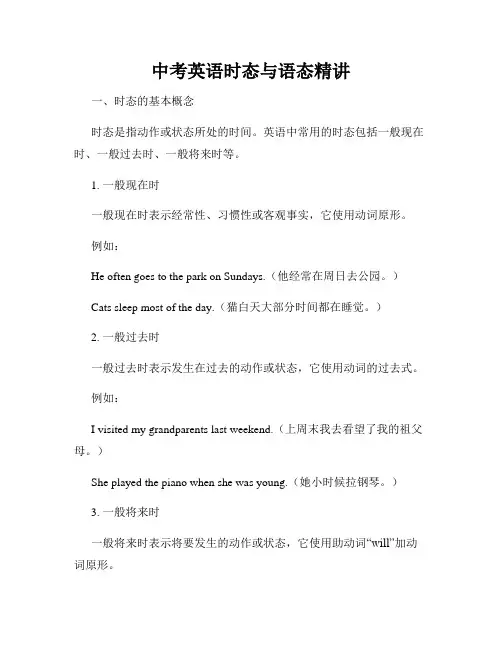
中考英语时态与语态精讲一、时态的基本概念时态是指动作或状态所处的时间。
英语中常用的时态包括一般现在时、一般过去时、一般将来时等。
1. 一般现在时一般现在时表示经常性、习惯性或客观事实,它使用动词原形。
例如:He often goes to the park on Sundays.(他经常在周日去公园。
)Cats sleep most of the day.(猫白天大部分时间都在睡觉。
)2. 一般过去时一般过去时表示发生在过去的动作或状态,它使用动词的过去式。
例如:I visited my grandparents last weekend.(上周末我去看望了我的祖父母。
)She played the piano when she was young.(她小时候拉钢琴。
)3. 一般将来时一般将来时表示将要发生的动作或状态,它使用助动词“will”加动词原形。
例如:I will go to the concert tomorrow.(明天我要去音乐会。
)They will finish their homework before dinner.(他们会在晚饭前完成作业。
)二、时态的变化规则时态的变化基本上是通过动词的变化来实现的。
1. 一般现在时的变化规则- 对于大多数动词,直接使用动词原形。
例如:I play football with my friends every Sunday.(我每个星期日都和朋友们踢足球。
)- 对于第三人称单数形式,加上“-s”或“-es”。
例如:She reads books every night.(她每晚都看书。
)- 对于以“-sh”、“-ch”、“-x”、“-o”结尾的动词,加上“-es”。
例如:He watches TV after dinner.(他晚饭后看电视。
)2. 一般过去时的变化规则- 对于大多数动词,加上“-ed”或者改变动词本身。
例如:They played basketball yesterday.(昨天他们打篮球。
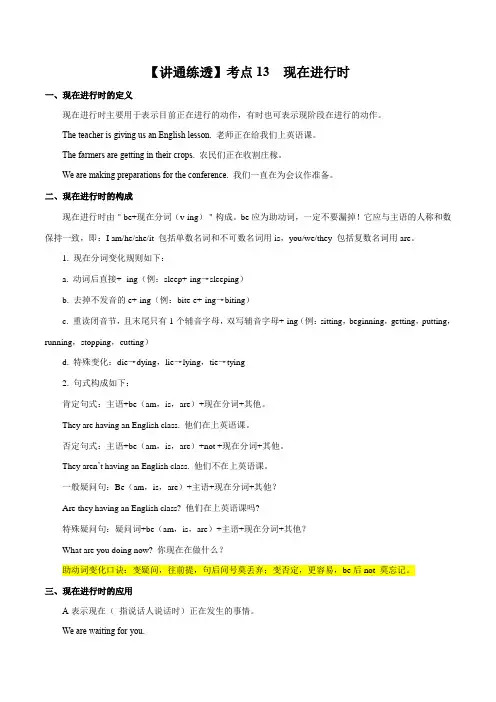
【讲通练透】考点13 现在进行时一、现在进行时的定义现在进行时主要用于表示目前正在进行的动作,有时也可表示现阶段在进行的动作。
The teacher is giving us an English lesson. 老师正在给我们上英语课。
The farmers are getting in their crops. 农民们正在收割庄稼。
We are making preparations for the conference. 我们一直在为会议作准备。
二、现在进行时的构成现在进行时由"be+现在分词(v-ing)"构成。
be应为助动词,一定不要漏掉!它应与主语的人称和数保持一致,即:I am/he/she/it 包括单数名词和不可数名词用is,you/we/they 包括复数名词用are。
1. 现在分词变化规则如下:a. 动词后直接+- ing(例:sleep+-ing→sleeping)b. 去掉不发音的e+-ing(例:bite-e+-ing→biting)c. 重读闭音节,且末尾只有1个辅音字母,双写辅音字母+-ing(例:sitting,beginning,getting,putting,running,stopping,cutting)d. 特殊变化:die→dying,lie→lying,tie→tying2. 句式构成如下:肯定句式:主语+be(am,is,are)+现在分词+其他。
They are having an English class. 他们在上英语课。
否定句式:主语+be(am,is,are)+not +现在分词+其他。
They aren’t having an English class. 他们不在上英语课。
一般疑问句:Be(am,is,are)+主语+现在分词+其他?Are they having an English class? 他们在上英语课吗?特殊疑问句:疑问词+be(am,is,are)+主语+现在分词+其他?What are you doing now? 你现在在做什么?助动词变化口诀:变疑问,往前提,句后问号莫丢弃;变否定,更容易,be后not 莫忘记。
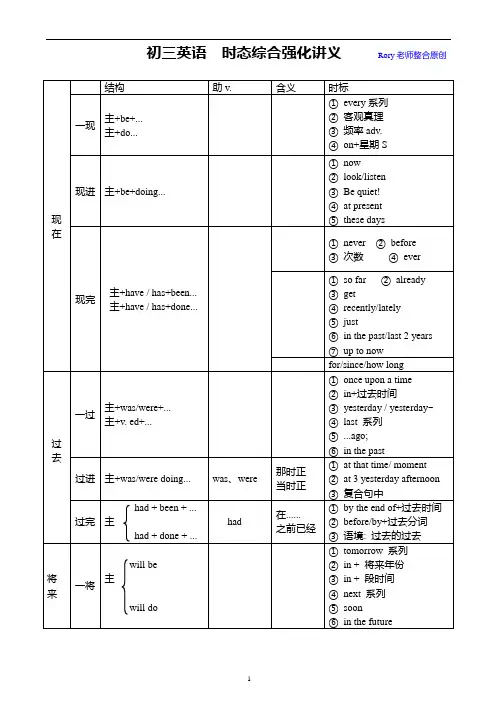
初三英语时态综合强化讲义Rory老师整合原创练习:一、单项选择( ) 1. I _____ Mr. Smith since he moved to Shanghai.A. didn’t hear fromB. don’t hear fromC. won’t hear fromD. haven’t heard from( ) 1. He is so careless that he always _____ his school things at home.A. forgetsB. forgetC. leavesD. left( ) 3. --What a nice bike! How long _____ you ____ it? --Just two weeks.A. will; buyB. did; buyC. are; havingD. have; had( ) 4. The clothing store ______ a sale. The clothes there arevery cheap.A. hasB. hadC. is havingD. was having( ) 5. --Let’s discuss the plan, shall we?--Not now. I _____ to an interview.A. goB. wentC. am goingD. was going( ) 6. My aunt is a writer. She __ more than ten books since 1980.A. writesB. wroteC. has writtenD. will write( ) 7. Your sweater looks smart. Where _____ you ______ it?A. do; getB. did; getC. will; getD. have; got( ) 8. When my dad comes back, he always _____ his shoes and leaves them by the front door.A. tries onB. takes offC. takes awayD. puts on( ) 9. --Are you going to the bank, Laura? --No, I _____ to the bank already.A. have beenB. have goneC. am goingD. had been( ) 10. Don’t make so much noise. The baby ______.A. sleepsB. is sleepingC. were sleepingD. slept( ) 11. --Could you tell me when Mr. Li ______ in Huanggang?--Sure. When he ______, I'll call you.A. arrives; will arriveB. will arrive; arrivesC. arrives; arrivesD. will arrive; will arrive( ) 12. --Where were you last Saturday? --I ______ in the Capital Museum.A. amB. will beC. wasD. have been( ) 13. If our government ____ attention to controlling food safety now, our health ____ in danger.A. won’t pay; isB. doesn’t pay; isC. won’t pay; will beD. doesn’t pay; will be ( ) 14. He usually ______ TV on Sunday evening.A. watchB. watchesC. watchingD. is watching( ) 15. I ____ my hometown for a long time. I really miss it!A. leftB. went away fromC. have leftD. have been away from( ) 16. -- _____ you _____ the football match yesterday? --Yes, I did. It was great.A. Did; watchB. Have; watchedC. Will; watchD. Were; watching( ) 17. She is ____ for London to study further.A. leavesB. leavingC. to leaveD. will leave( ) 18. I will tell him the good news as soon as he ______ back.A. comesB. cameC. will comeD. is coming( ) 19. --Have you ______ your ticket, sir? --No, I’m still ______ it.A. found; findingB. looked for; looking forC. found; looking forD. looked for; finding( ) 20. --Shall we go shopping now? --Sorry, I can't. I ______ my shirts.A. washB. washesC. washedD. am washing( ) 21. Mr. Smith _____ a talk on country music next Monday.A. giveB. gaveC. has givenD. will give( ) 22. Miss Gao isn’t here. She _______ to the bus station to meet Mr. Brown.A. goB. has goneC. has beenD. would go( ) 23. Listen! some of the girls _____ about the Voice of China. Let's join them!A. are talkingB. talkC. will talkD. talked( ) 24. He turned off the lights and then _____ the classroom.A. leavesB. will leaveC. is leavingD. left( ) 25. Light _____ much faster than sound.A. travelB. travelsC. travelled( ) 26. Hurry up! The play ______ for ten minutes.A. has begunB. had begunC. has been onD. began( ) 27. I ____ to bed until my granny came back home.A. didn’t goB. wentC. had goneD. have gone( ) 28. This is a very interesting film. I _____ it twice already.A. will seeB. seeC. sawD. have seen( ) 29. I have been to Shanghai. I ______ there last month.A. goB. wentC. have goneD. will go( ) 30. --Excuse me, where is Mr. Brown’s office? --Sorry, I don’t know. I ____ here for only a few days.A. workB. workedC. have workedD. will work( ) 31. It ____ usually ______ at this time of year, but today it is raining heavily.A. is; rainingB. won’t; rainC. has; rainedD. doesn’t; rain( ) 32. My grandmother _____ a lot of changes in Tianjin since she came here.A. seesB. can seeC. will seeD. has seen( ) 33. I left my book on the desk and now it's gone. Who _____ it?A. will takeB. takeC. has takenD. had taken( ) 34. --Have you ever been to Shanghai?--Yes. I ______ there a few months ago.A. have beenB. wentC. have gone( ) 35. --Jimmy is leaving for a holiday. --Really? Where _____ he ______?A. has; goneB. will; goC. did; goD. does; go( ) 36. --Where is your father? --He _____ Australia and he ____ Sydney for two weeks.A. has been to; has been inB. has gone to; will stay inC. has been in; has been toD. has gone to; has stayed to( ) 37. My sister _____ painting two weeks ago, but soon she lost interest in it.A. took upB. takes upC. took offD. took out( ) 38. He promised to pick me up at the school gate. However, he _____ yet.A. didn’t arriveB. doesn’t arriveC. isn’t arrivingD. hasn’t arrived( ) 39. I _____ my homework, I guess I can’t join you.A. don’t finishB. didn’t f inishC. haven’t finishedD. won’t finish( ) 40. John likes playing soccer very much and he _____ about one hour playing it every day.A. spentB. will spendC. has spentD. spends二、用所给单词的适当形式填空1. The children will go to the zoo if it ________________ (not rain) this Saturday.2. You’d better _________ (eat) less food before you go to bed.3. He writes well but his sister _________________ (not write) well.4. The workers ______________________________ (build) another bridge next year.5. I haven't seen my grandma for a long time. I _____________________________ (visit) her soon.6. I ____________________ (be) thirty-five next year.7. It is very cold these days. It _______________________________ (snow) soon.8. Mike ____________________ (not, believe) this until he ___________ (see) it with his own eyes.9. My father __________________ (leave) Shanghai next Tuesday.10. Jack ___________________ (swim) next week.11. We __________________ (see) our teacher tomorrow.12. I ______________(leave)in a minute. I _____________(finish)all my work before I __________ (leave).13. I ________(be)tired. I ____________(go)to bed early tonight.14. Most of us don't think their team ____________(win).15. --_________ you ________(be)here this Saturday?--No. I _____________(visit)my teacher.16. We___________________ (practice) hard these days.17. The boy _____________________ (draw)a picture at present.18. —What are you doing, Jane? —I _________________(dig) a hole to plant the tree.19. He _________ (买) a new watch in Paris. He wears it almost every day.20. Oh my God! I _________ (leave) my dictionary in the reading room just now.21. The Sawyers _______ (be) at the beaches last Sunday.22. — _______ you _______ (clean) the room yet?— Yes. We ________ (clean) it a moment ago.23. — _______ your uncle ________ (arrive)?—No, he hasn’t.24. — Have you ________ (be) to New Zealand? — No, never.三、按要求做题1. John wants to see his grandmother once a week. (对划线部分提问)____________ ____________ ____________ John go to see his grandmother.2. The firemen and the fire engine will arrive in five minutes.(对划线部分提问)________________________________________________________3. Tom does his homework at home. (对划线部分提问)________________________________________________________4. The dogs are running along the wall. (对划线部分提问)________________________________________________________5. We are playing in the garden. (对划线部分提问)________________________________________________________6. She is singing. (对划线部分提问)________________________________________________________7. Jim is watching TV. (对划线部分提问)________________________________________________________8. 他刚刚问了我一个有趣的问题。
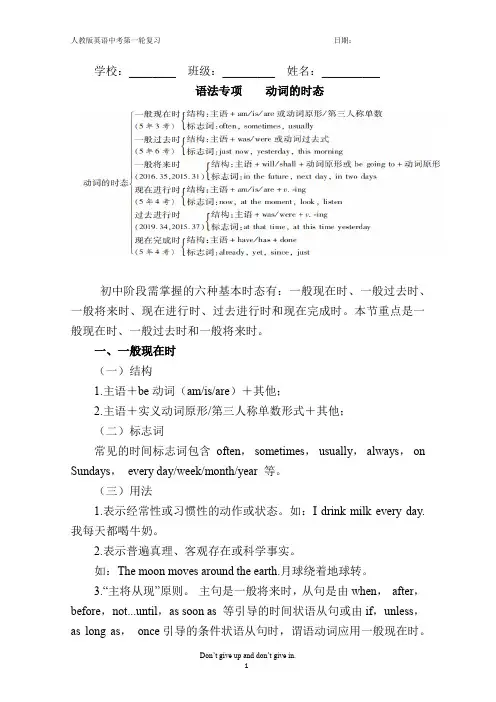
学校:________ 班级:_________ 姓名:__________语法专项动词的时态初中阶段需掌握的六种基本时态有:一般现在时、一般过去时、一般将来时、现在进行时、过去进行时和现在完成时。
本节重点是一般现在时、一般过去时和一般将来时。
一、一般现在时(一)结构1.主语+be动词(am/is/are)+其他;2.主语+实义动词原形/第三人称单数形式+其他;(二)标志词常见的时间标志词包含often,sometimes,usually,always,on Sundays,every day/week/month/year 等。
(三)用法1.表示经常性或习惯性的动作或状态。
如:I drink milk every day. 我每天都喝牛奶。
2.表示普遍真理、客观存在或科学事实。
如:The moon moves around the earth.月球绕着地球转。
3.“主将从现”原则。
主句是一般将来时,从句是由when,after,before,not...until,as soon as 等引导的时间状语从句或由if,unless,as long as,once引导的条件状语从句时,谓语动词应用一般现在时。
如:I will tell you as soon as I know the result.我一知道结果就告诉你。
二、一般过去时(一)结构1.主语+be动词(was/were)+其他;2.主语+实义动词过去式+其他;(二)标志词常见的时间标志词包含yesterday,just now,two days ago,last night/week/month/year,the other day 等。
(三)用法1.表示过去某个时间发生的动作或存在的状态。
如:Last year I went to the Hangzhou National Tea Museum. 去年我去了杭州国家茶叶博物馆。
2.表示在过去一段时间内,经常性或习惯性的动作。
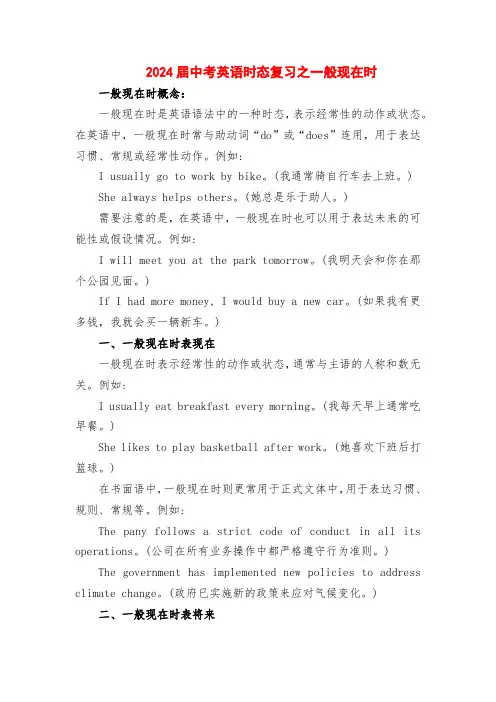
2024届中考英语时态复习之一般现在时一般现在时概念:一般现在时是英语语法中的一种时态,表示经常性的动作或状态。
在英语中,一般现在时常与助动词“do”或“does”连用,用于表达习惯、常规或经常性动作。
例如:I usually go to work by bike。
(我通常骑自行车去上班。
)She always helps others。
(她总是乐于助人。
)需要注意的是,在英语中,一般现在时也可以用于表达未来的可能性或假设情况。
例如:I will meet you at the park tomorrow。
(我明天会和你在那个公园见面。
)If I had more money, I would buy a new car。
(如果我有更多钱,我就会买一辆新车。
)一、一般现在时表现在一般现在时表示经常性的动作或状态,通常与主语的人称和数无关。
例如:I usually eat breakfast every morning。
(我每天早上通常吃早餐。
)She likes to play basketball after work。
(她喜欢下班后打篮球。
)在书面语中,一般现在时则更常用于正式文体中,用于表达习惯、规则、常规等。
例如:The pany follows a strict code of conduct in all its operations。
(公司在所有业务操作中都严格遵守行为准则。
) The government has implemented new policies to address climate change。
(政府已实施新的政策来应对气候变化。
)二、一般现在时表将来一般现在时表将来是英语语法中的一种时态,表示将来的动作或状态。
在英语中,一般现在时通常与将来时态连用,形成“一般现在时+将来时”的句型,用于表达将来的意图、计划或安排。
例如:I'm going to meet my friend tomorrow afternoon。
英语中考专项一般现在时态一般现在时态(Simple Present Tense)是英语中最基础的时态之一,用来表达经常性或普遍性的动作、状态或真理。
它通常用于以下情况:1. 表示经常性动作或习惯:I go for a walk every morning.(我每天早上散步。
)They always eat lunch at noon.(他们总是在中午吃午饭。
)2. 表示普遍事实、真理或常规规律:The sun rises in the east.(太阳从东方升起。
)Water boils at 100 degrees Celsius.(水在100摄氏度沸腾。
)3. 表示现状或持续状态,而非临时行为:She works as a teacher.(她是一名教师。
)He lives in New York City.(他住在纽约市。
)一般现在时态的时间标志词如下:1)所有于every 连用day morning afternoon evening night 等2)于所有频率副词连用always usually often sometimes hardly ever never3)表示次数:once a week twice a month on sundays 等等。
形式上,一般现在时态的基本结构是:主语+ 动词原形(第三人称单数要加s或es)+ 其他附加成分。
1)动词be疑问式和简略答语2)动词do.疑问式和简略答语当主语是第三人称单数时,动词形式有以下几种变化总结起来,一般现在时态用于表达经常性动作、普遍事实和现状状态。
同时,我们还需要注意主语的单复数和动词形式的匹配。
小试牛刀:一、用所给词的正确形式填空1.We often ___________(play)in the playground.2.He __________(get)up at six o’clock every morning.3._________you __________(brush)your teeth every night?4.What ___________(do)he usually ___________(do)after school?5.Mike sometimes ___________(go)to the park with his sister.6.She often___________(watch)TV with her parents in the evening.7.________Mike___________(read)English storybooks every day?8.She is very famous and she often ____________(appear)on TV.9.My mother often __________(tell)stories to my younger brother before he goes to bed.10.Tom often ____________(study)Chinese in the evening.答案:一、用所给词的正确形式填空1. We often play in the playground.2. He gets up at six o'clock every morning.3. Do you brush your teeth every night?4. What does he usually do after school?5. Mike sometimes goes to the park with his sister.6. She often watches TV with her parents in the evening.7. Does Mike read English storybooks every day?8. She is very famous and she often appears on TV.9. My mother often tells stories to my younger brother before he goes to bed.10. Tom often studies Chinese in the evening.二:选择填空:好的,以下是10道英语中一般现在时态的选择题:1. My sister ___________ to music every day.A. listenB. listensC. listened2. We ___________ to school by bus.A. goB. goesC. went3. The sky ___________ blue on a sunny day.A. isB. wasC. are4. He ___________ football with his friends after school.A. playB. playsC. played5. She ___________ coffee in the morning.A. likeB. likesC. liked6. The children ___________ in the park on weekends.A. playB. playsC. played7. My dad ___________ the newspaper every morning.A. readB. readsC. reading8. The sun ___________ in the morning and sets in the evening.A. risesB. roseC. rise9. They ___________ TV before they go to bed.A. watchB. watchedC. watching10. The cat ___________ on the windowsill.A. sitsB. satC. sitting答案:1. B2. A3. A4. B5. B6. A7. B8. A9. A 10. A。
第八讲时态教学目标1.准确辨别出各种时态。
2. 掌握各个时态的基本构成。
3. 熟记各个时态的标志词并根据标志词准确答题4. 尝试用各个时态造句,培养语言表达能力。
课程类型新授课课程时长90分钟重点句子1.After a while, I stood up and advised them to stop smoking and behaved themselves.过了一会儿,我站起来建议他们停止吸烟,并且要守规矩。
2.The future of our country lies in teenagers ,who should not only obey the rules in public but also make contributions to the society.国家的未来取决于青少年,青少年不仅应该遵守公共规则,而且也要为社会做出贡献。
3.Playing sports every day can help us keep fit.每天做运动,能够帮助我们保持健康。
课堂导入I have breakfast at seven every day.I had breakfast just now.I will have breakfast at seven tomorrow.I am having breakfast now.I was having breakfast at 7a.m. yesterday.I have had breakfast already.1.动词原形、第三人称单数形式、现在分词2.动词的过去式及过去分词的构成考点二常见6种时态的构成及用法现在完成时(1)过去发生的动作一直持续到现在(有可能持续下去)此用法中动词必须是延续性动词:如;leave→be away、borrow→keep、buy→have,(2)过去发生的动作对现在有影响和结果主语+have/has+过去分词1.for+时间段;长达...2.since+时间段+ago/since+时间点/since+一般过去时句子;自从...3.in the past/lastxx years;4.so far/until now5.already,6.yet,7.ever8.Over the years..1.He has studied Englishfor 5 years.2.I have already eatenmy lunch.3.He has been toBeijing.补充:1.since公式:主语+have/has done,since 主语+did.或者since 主语+did,主语+have/has done.(切记,since从句部分一定要用一般过去时)例:Tommy has studied very hard since he came to our school.或since he came to our school,Tommy has studied very hard .2.现在完成时当中动作是持续一段时间的,所以动词要用延续性的动词。
动词的时态一、动词基本形式(原形;第三人称单数;现在分词;过去分词;过去式)原形:位于情态动词后、助动词后、感官动词或使役动词后、跟在to后面构成动词不定式。
第三人称单数:一般现在时里,当主语是第三人称单数时,动词用第三人称单数形式。
现在分词:现在分词与be动词构成进行时态。
过去式:过去式用在一般过去时里。
过去分词:过去分词用在现在(过去)完成时和被动语态中,规则变化同过去式,不规则见不规则动词表。
二、动词的时态时间标志:1. often, usually, always, sometimes 2. every +时间类如:every day/week/month3. on Sundays;once a week;twice a day;in the morning/evening/afternoon.注意:often, usually, always在句子的位置:通常是在be动词之后,行为动词之前。
☆延续性动词与非延续性动词1.延续性动词表示能够延续的动作。
如:learn, work, stand, sleep, live, stay等。
延续性动词可以与表示时间段的状语连用。
如:You can keep the book for 5 days. 这本书你能借5天。
2.非延续性动词也称终止性动词、瞬间动词,表示不能延续的动作,这种动作发生后立即结束。
不能与时间段连用。
如: die, close, begin, come, borrow, buy等。
如果要与时间段连用,就把它转为延续性动词使用。
3.中考常见的延续性动词与非延续性动词之间的转换有:join—be in+组织机构或be a member of+组织机构;get married ——be married;catch a cold — have a cold;get to/ arrive/reach — be in;fall asleep — be asleep;die—be dead;borrow—keep;buy—have;close—be closed;fall ill—be ill;finish—be over;become — be;open—be open;come back — be back;leave — be away;come here — be here;begin/start — be on。
时态综合
【key points】
时态综合——用法
一般现在时:现在的状态和经常反复的动作一般过
去时:过去的状态和动作
现在进行时:现在正在进行的动作时态
综合——构成
一般现在时:
主语 + be (am/is/are) + 其他
主语 + 实义动词(原形/单三) + 其他一般
过去时:
主语 + be(was/were) + 其他
主语 + 实义动词过去式 + 其他现在进
行时:
主语 + be + 动词-ing + 其他时
态综合——标志词
一般现在时:
in the morning / on Sund ays / every day / usually, often, always…一般过去时:
yesterday / last week / two hours ago / just now
现在进行时:
now, right now, at the moment / look, listen / these days
小试牛刀
【exercise】
用括号中动词的适当形式填空。
1.He (get) up at six o’clock every day.
2.Look! The dog (run) after a cat.
3.We (swim) yesterday afternoon.
4.—Where is Tom?
—He (lie) on the beach.
5.Lucy cleaned the room and (take) a walk.
6.He always (stay) at home last summer vacation.
时态综合——句式变换一
般现在时:
①I am in Zhengzhou.
否定 I’m not in Zhengzhou.
一般疑问 Are you in Zhengzhou?
特殊疑问 Where are you?
②Tom loves cats.
否定 Tom doesn’t love cats.
一般疑问 Does Tom love cats? 特
殊疑问 What does Tom love? 一般
过去时:
① I was in Zhengzhou.
否定 I wasn’t in Zhengzhou.
一般疑问 Were you in Zhengzhou?
特殊疑问 Where were you?
② Tom loved cats.
否定 Tom didn’t love cats.
一般疑问 Did Tom love cats? 特
殊疑问 What did Tom love? 现在
进行时:
Tina is looking for her dog.
否定Tina isn’t looking for her dog. 一般疑问 Is Tina looking for her dog? 特殊疑问 What is Tina looking for?
【小试牛刀】
1.Lily is 8 years old.
否定:
一般疑问:特
殊疑问:
2.Mr. Li likes playing the piano.
否定:
一般疑问:特
殊疑问:
3.He wrote a letter yesterday.
否定:
一般疑问:特
殊疑问:
时态常考难点
ually, often, always …频率副词可用于一般现在时、一般过去时;
always 还可用于现在进行时表强烈感情色彩
2.客观真理和自然现象等不受其他时态影响,要用一般现在时。
【综合训练】一
、填空
1.We (be) students two years ago.
2. you (brush) your teeth every morning?
3.You can’t leave now. It (rain) outside.
4.—What Jeff (do) last night?
—He (watch) TV.
5.He (not watch) TV now.
6.My sister (not exercise) at noon and my brother
(not do) his homework at night.
7.David usually _ (have) dinner at six. It’s seven
o’clo ck now. He (have) his dinner.
8.—When Allan usually (do) some reading?
—He usually (do) it in the evening, but yesterday he (do) some reading in the morning.
二、单选
1.Please keep quiet! These babies now.
A.sleeps
B. are sleeping
C. sleep
D. slept
2.—Have you read the news?
—Yes. I it a month ago.
A.am reading
B. have read
C. will read
D. read
3.—Where you _ lunch?
—At home. There was no school lunch.
A.did; have
B. are; having
C. will; have
D. do; have
4.Lucy _ a student last year, but now she a teacher.
A.is; is
B. was; is
C. was; will be
D. is; was
5.My sister early on Sundays.
A.don’t get up
B. don’t gets up
C. doesn’t get up
D. doesn’t gets up
6.He usually
to school on his father’s car when he was young.
A.goes
B. go
C. went
D. going
7.He said that light _ much faster than sound.
A.has travelled
B. went
C. travels
D. travelled
8.There some flowers on the teacher’s desk just now,but now there nothing on it.
A.have; has
B. were; was
C. were; is
D. has; has
9.The teacher told the students that five and five ten.
A.is
B. are
C. was
D. were
10.—Could you tell me ? He is wanted by the head teacher.
—Sorry, I’ve no idea. But he here just now.
A.where Tim was; was
B.where is Tim; was
C.where Tim is; was
D.where Tim is; is
讲义参考答案
时态综合—用法,构成,标志词
【小试牛刀】
用括号中动词的适当形式填空。
时态综合—句式变换
【小试牛刀】
1.Lily is 8 years old.
否定:Lily isn’t 8 years old.
一般疑问:Is Lily 8 years old?
特殊疑问:How old is Lily?
2.Mr. Li likes playing the piano.
否定:Mr. Li doesn’t like playing the piano.
一般疑问:Does Mr. Li like playing the piano?
特殊疑问:What does Mr. Li like?
3.He wrote a letter yesterday.
否定:He didn’t write a letter yesterday.
一般疑问:Did he write a letter yesterday?
特殊疑问:What did he do yesterday?
【综合训练】一
、填空
1.were
2.Do; brush
3.is raining
4.did;do;watched
5.isn’t watching
6.doesn’t exercise; doesn’t do
7.has; is having
8. does; do; does; did
二、选择题
1—5:BDABC
6—10:CCCAC。